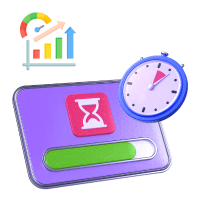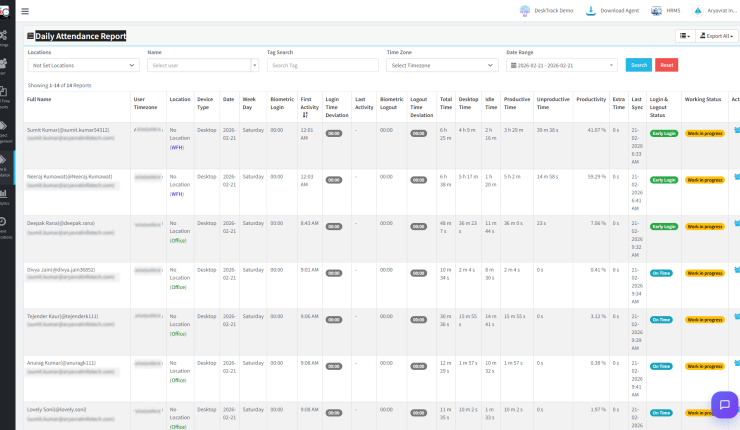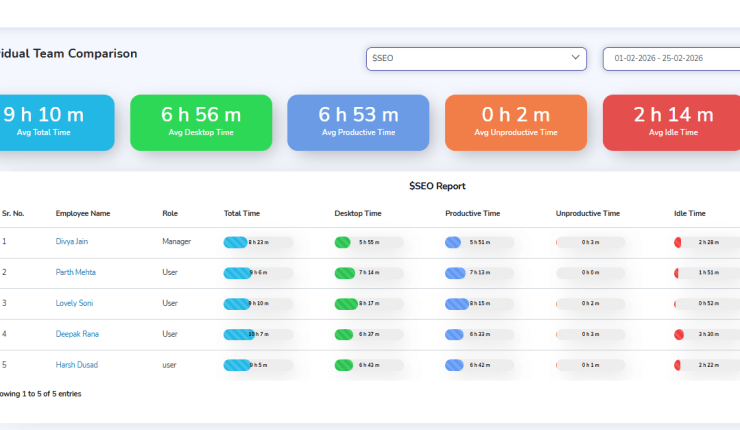Is working remotely really productive? Nowadays, working remotely has become a productive trend. In this era of technology, apps, communication, and video conference tools make remote working more accessible. Working in an office has become less of a necessity for many businesses. Every business going to remote & operate easily, but the question has arisen, is remote working remotely effective? Because every organization is worried about remote work productivity.
A survey conducted by owl labs found that “70% of employees in the US are working remotely. Also many employees choosing to resign for a better work-life balance & shifting to remote work”.
Remote Work Productivity Statistics
When it comes to reducing business operating costs and managing work-life balance, remote working becomes a choice for every business and individual. Here are some statistics on productivity while working remotely, confirming that remote working is on the rise.
- 70% of professionals work remotely for at least one day each week.
- 56% of startups around the world have outsourced their work to remote workers.
- Employee retention rates rise by 10% in organizations.
- 39% of people working from home complete their tasks faster than those in traditional workplaces.
- 82% of remote working employees report lower amounts of stress than in their traditional offices.
- 30% of remote working employees said that telecommuting helped them to fulfill more in less time.
- Companies of all sizes report large reductions in operating costs after implementing remote working strategies.
- 48% of remote workers say that working away from the office helps them to improve their motivation levels.
- 32% of staff find it hard to switch off in their personal time if they work remotely.
How Much More Productive People at Work from Home Compared to Office
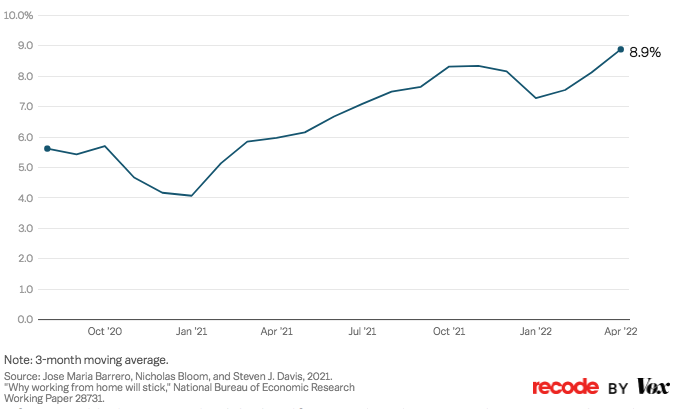
Impact of Work from Home on Productivity
Some companies still believe that Remote workers are more productive in the office instead of at home. Companies say that Working from home affects remote workers’ productivity because they are in inattentive mode at home. They don’t have fear of any senior persons and they can also do whatever they want, it is not good for any organization. The impact of remote work is very bad and it is crucial
But in fact, according to forbes, Remote workers are more productive than those who work in an office. Because employees can set their own schedule, they can work when they are more productive, rather than 9-5. In remote work, employees work according to their flexibility they can’t follow the 9-5 rule at home. Just because every person has their own time to be productive. If employees can do the work according to their work schedule can provide better results & increase remote workers productivity.
Benefits of Working Remotely
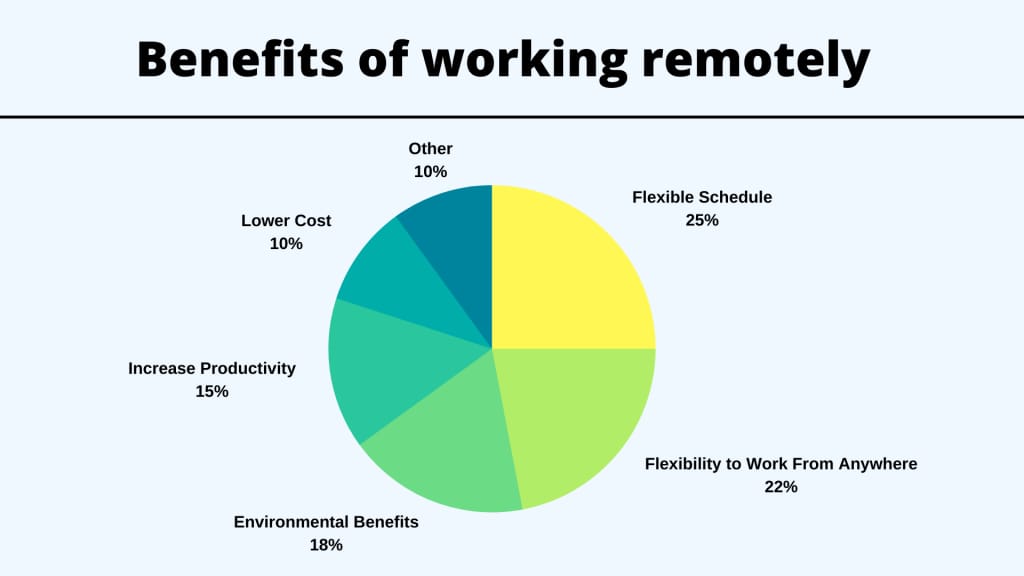
Productivity
One of the most crucial benefits that come with remote workers. Employees who work from home are more productive than their office counterparts. As the home is likely to be a more productive environment than a traditional office; employees can set up a place at home where nobody will distract them, which further helps them to produce higher productivity. It is the effect of remote work on productivity.
Hire More Talent
Hiring remote employees allows managers to choose ‘the best of the best team’. Employers will be able to focus on hiring talented employees from anywhere in the world; who have the necessary skills required for a particular job.
Performance
Employees, working remotely, complete their projects and tasks with full quality as they are skilled enough for particular tasks. They lead to speedy and quality delivery of the project. Every employee wants to become productive at the work from home. Also, read Impact of remote working on employee engagement
Retention
There is also the biggest benefit of hiring a remote team, when it comes to employee retention rate, employees will be more loyal to the organization if the organization gives them more flexibility because it is the biggest requirement of many.
Profitability
Hiring a remote team also gives managers financial benefits as they can save a lot of money on necessary pieces of equipment, office workspace, and lower employee salary. According to the studies, Organizations save an average of $11,000 per year per remote employee, which is 21% more profitable.
The Disadvantages of Remote Working
There are also some significant disadvantages of remote work. The biggest problems are managing the productivity of remote workers as well as lack of communication, using high-cost communication technology, and lack of relationships among coworkers, which leads to social isolation, and sometimes it creates conflicts. Employees who work from a particular location with a poor internet connection many times face difficulties when attending online meetings.
The other major concern among managers is whether employees who are hired to work remotely are keeping up their responsibilities properly or not. Are they really productive or not?
How to Increase Work from Home Productivity
Work from home can be a great opportunity for you to increase your productivity and get more done. But it’s not always easy to have the time or energy to work from home. If you’re feeling burnt out and overwhelmed by the piles of work in front of you, here are top 10 work from home productivity tips:
-
-
Reduce distractions
The best way to increase your productivity is by reducing the number of distractions in your life. If there are too many things going on, you won’t be able to focus on anything else. To avoid this problem, try turning off the TV or putting away electronic devices so that they don’t tempt you into checking them throughout the day.
-
Schedule breaks
It’s easy to get caught up in work because we love what we do and want it done right now! But it’s important that we take breaks every once in a while so that our minds don’t go crazy with too much information all at once. Make sure that you schedule regular breaks throughout the day so that you can recharge yourself mentally and physically before returning to work again
-
Wake up Early
Early mornings are often the best time to start your day. But if you have trouble getting up early, try taking advantage of breaks throughout the evening when you’re not focused on work. For example, if you’re working from home, try setting an alarm for 15 minutes before bedtime so that you can take care of some chores around the house such as making sure all lights are off and doors are locked before going to sleep.
-
Designate your own Workplace
To help you get more done, designate a special workspace for your online business. This can be a dedicated desk or table in the corner of your home office, or any other place where you can focus on work without distractions.
-
Eliminate the Digital Distractions
The second most common reason people don’t get much done at home is because they have too many digital distractions competing for their attention: phones buzzing, email pinging and Facebook notifications popping up every few seconds! These little interruptions can keep us from getting any real work done and make
-
Set Times for Checking Email
Set times when you will check your email. If you can’t remember to do it, set the timer and do it anyway. If you are busy and find yourself checking your email at 4pm, then don’t touch it until 5pm. This is a great way to increase productivity and stop procrastinating.
-
Make a To-Do List Every Day
Make sure that you have made an actionable to-do list for each day of the week. You don’t need to be perfect with this, but as long as there are clear objectives and tasks that are completed each day, you will get more done!
-
Multitasking
Multitasking is the key to a productive day, but it’s not the same thing as multitasking. Many people think they’re multi-tasking because they’re checking email and responding to texts while they’re working, but that’s not really multitasking at all.
-
Conclusion
It is clear that remote work productivity increases & already getting more popular even before the global crisis. Remote teams can produce much better results and save you thousands in cost.
Managers need to implement some great strategies to reduce the potential feeling of isolation among remote employees. Measuring employee performance and productivity might be a little difficult at first but there are a number of Employee Monitoring and Time Tracking Software in the market that can further help both employers and employees produce greater productivity.
If the organizations are able to manage the cost of technological aspects then hiring a remote team can be a good option and they can definitely get benefits from the remote team while using the employee monitoring tool.











